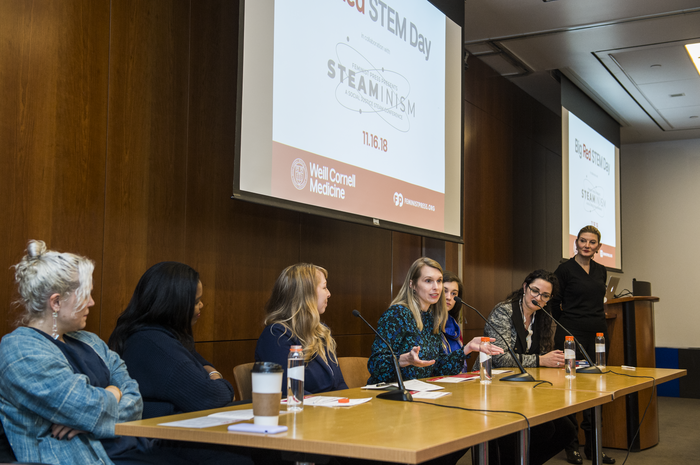Panel presentations and group discussions allow participants the opportunity to deeply discuss and understand a topic, engaging in conversation and asking questions of content experts. Participation in inclusive group discussions builds participant confidence and communication skills, encouraging them to formulate their ideas and express themselves through their own views.
Big Red STEM Day has incorporated group discussions and panel presentations throughout its programmatic past. Most recently, in response to the COVID-19 pandemic, Government and Community Affairs has offered a number of Big Red STEM Day Discussions Series virtual events which have reached participants in 8 states and more than 25 countries internationally.
Samples of Past Group Discussions Include:
Benefits of Mindfulness in Student Mental Health
Mindfulness is the skill of focusing the mind to be in the present moment. Learning this skill helps us to work with rather than fight off challenging situations, whether academic or social. People in some of the most high-pressure careers—whether athletes, military service members, or business executives—do mindfulness meditation and credit it as a factor in their success. Albert Einstein, the world-famous physicist, is said to have practiced a form of focused attention. Mindfulness can be learned through daily meditation-type practices—short exercises that do not require much time or equipment and that cost us nothing—they can even be fun! This session introduces some of these practices. Participants leave with specific suggestions for how to make mindfulness part of their own self-development.
Developing Your STEM Identity: Using Personal & Professional Values for a Cohesive Self
Our passions help drive our purpose. Whether it is discipline from dance, synthesizing complex ideas for debate, strategy from chess club, or teamwork from group sports, our interests contribute to our professional identities. But how can we achieve an environment where these skills can excel to create an academic center that is inclusive and supports authenticity across diverse individuals? How can these skills enhance work across roles to promote professional evolution that complement others on a team? What steps can you take now to cultivate a strong STEM identity for future academic and career pursuits without losing or sacrificing your passions? How can you recognize your personal values and leverage them for the future?
Failure: A Stepping Stone to Success
While science and storytelling may not seem to have much in common, they are closely related. In both social media and in our resumes, we tend to highlight our successes while keeping our rejections to ourselves. What would happen if we shared our “failures”? In this discussion, Weill Cornell Medicine panelists share their stories about their paths in Science, Technology, Engineering and Math (STEM) and the many “failures” they experienced along the way. They talk about how these failures were instrumental to later success and discuss how to craft your own story based on your successes, failures, and goals. Students can apply insights learned to writing their personal statements and preparing for interviews in the future.
Global Health
Disease operates without borders. According to the Centers for Disease Control and Prevention, “In today’s interconnected world, diseases can spread from an isolated, rural village to any major city in as little as 36 hours.” Weill Cornell Medicine seeks to address health problems that transcend national boundaries through service, research and training. In this group session, Weill Cornell Medicine leads a discussion spanning an overview of what global health is and background on some of the health ailments that developed and undeveloped worlds suffer, to the ways in which Weill Cornell Medicine students and faculty participate and contribute to global health through projects, research, and trips.
Navigating Higher Education as a First-Generation Student
Nearly one in three undergraduate students attending college in the US are first-generation students – those who have no parent with a bachelor’s degree. While all students may struggle with the transition to college, the problem is intensified for first generation college students who face additional adjustment barriers and difficulty accessing and understanding important resources. During this group discussion, students will have the opportunity to speak with Weill Cornell Medicine panelists who are the first in their families to attend a 4-year college. Panelists will discuss their personal paths, the challenges they faced and advice they wish to pass on to others.
Research Fundamentals: Constructing Your Best Hypothesis and Other Research Best Practices
Weill Cornell Medicine scientists target some of the most formidable health challenges of the 21st century, including cancer, cardiovascular disease, metabolic diseases, neurodegenerative diseases such as Parkinson’s and Alzheimer’s, diseases affecting children, and infectious diseases, especially those with significant impact on the developing world. Our researchers are pushing scientific discoveries forward, quickly applying breakthroughs made in the laboratory to the clinic. However, that all starts with a testable hypothesis! This group session will answer the question, “Where do I start?” when conducting research, and other research best practices.
Unconventional Careers in STEM
Oftentimes when people think of healthcare professions, they immediately think of doctors and nurses. While doctors, nurses, surgeons and researchers are critical to an academic medical center, there are many other exciting medical careers to consider in addition to working as a physician or a nurse. Music therapists, phlebotomists, pharmacologists, lab technicians, security officers, engineers, imaging technicians, biostatisticians and information technologists, among many others. This group discussion explores how different people have taken their passion and backgrounds and turned it into an alternative, or “unconventional,” healthcare career in STEM.
For more information on Group Discussions and Panels, please email us at communityaffairs@med.cornell.edu.


